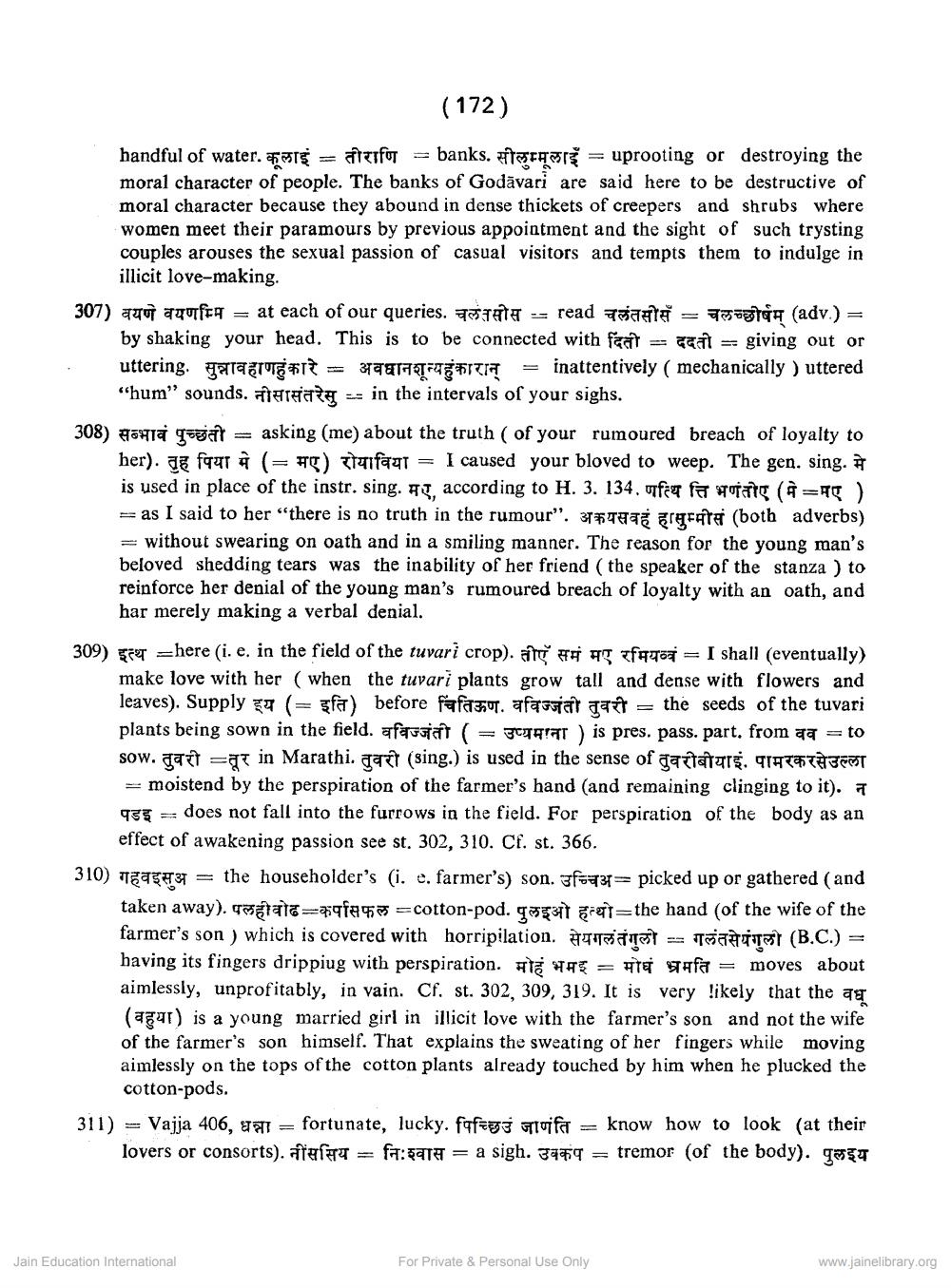________________
(172)
handful of water. कूलाई
तीराणि = banks. सीलुम्मूलाइँ = uprooting or destroying the moral character of people. The banks of Godavari are said here to be destructive of moral character because they abound in dense thickets of creepers and shrubs where women meet their paramours by previous appointment and the sight of such trysting couples arouses the sexual passion of casual visitors and tempts them to indulge in illicit love-making.
307) वयणे वयणम्मि at each of our queries. IMA - read चलंतसोस चलण्डीर्षम् (adv.)== This is to be connected with fat ददती giving out or अवधानशून्यहुंकारान् inattentively (mechanically) uttered in the intervals of your sighs.
by shaking your head. uttering सुझाव हाणहुंकारे "hum" sounds. adat
=
308) सम्भावं पुच्छती asking (me) about the truth (of your rumoured breach of loyalty to her). तु पिया मे (मए) रोयाविया I caused your bloved to weep. The gen. sing. is used in place of the instr. sing. #q, according to H. 3. 134, fer fertig (4) as I said to her "there is no truth in the rumour". saang gegedte (both adverbs) = without swearing on oath and in a smiling manner. The reason for the young man's beloved shedding tears was the inability of her friend (the speaker of the stanza) to reinforce her denial of the young man's rumoured breach of loyalty with an oath, and har merely making a verbal denial.
=
311) Vajja 406,
309) here (i. e. in the field of the tuvari crop). în
=
efqq I shall (eventually) make love with her (when the tuvari plants grow tall and dense with flowers and leaves). Supply इ (इति) before चितिऊण वविनंती तुवरी the seeds of the tuvari plants being sown in the field. afersieft ( उप्यमाना ) is pres. pass. part. from वव : to sow. तुवरी तूर in Marathi. तुवरी (sing. ) is used in the sense of तुवरीबीयाई. पामरकरसेउल्ला moistend by the perspiration of the farmer's hand (and remaining clinging to it). 935 does not fall into the furrows in the field. For perspiration of the body as an effect of awakening passion see st, 302, 310. Cf. st. 366.
Jain Education International
the householder's (i. e. farmer's) son. afer
picked up or gathered (and
हन्योthe hand (of the wife of the nsäget = nsaide (B.C.) गलंतसेयंगुली =
मोषं भ्रमति - moves about
310) गहवइसुअ taken away ). पलड़ीवोढ कर्पासफल cotton pod. पुलइओ farmer's son) which is covered with horripilation. having its fingers drippiug with perspiration. मोहं भमइ aimlessly, unprofitably, in vain. Cf. st. 302, 309, 319. It is very likely that the ag (agar) is a young married girl in illicit love with the farmer's son and not the wife of the farmer's son himself. That explains the sweating of her fingers while moving aimlessly on the tops of the cotton plants already touched by him when he plucked the cotton-pods.
=
=
lovers or consorts) नींससिय
=
=
=
fortunate, lucky, fafifa
=
know how to look (at their
निःश्वास = उवकंप - a sigh. 47 tremor (of the body). g
For Private & Personal Use Only
www.jainelibrary.org




